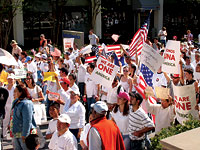
The price of a parade: The city of Asheville charged the organizers of this May 1 rally $1,500 in fees — a sum challenged in a new federal lawsuit.
|
The American Civil Liberties Union is going head to head with the city of Asheville in a dispute over parade permit fees. The ACLU maintains that the $1,500 the city charged We Are One America of WNC for a permit for the group’s May 1 march is “grossly excessive” and “violates federal and state constitutional rights to free speech,” according to a press release issued by the group.
“We don’t mind paying a reasonable permit fee for administrative expenses as required by city code, but the Police Department just kept tacking on more and more charges for services we never requested, never needed and should not have had to pay for,” said event organizer Danielle Fernandez. “These burdensome costs were unfair and illegal, and we want to make sure that the city doesn’t do this again to any other groups or individuals seeking to exercise their free-speech rights in Asheville.”
At the time, the city said the money was needed to cover the cost of policing, the rental of Pack Square, barricades and lost parking-meter revenues. APD Public Information Officer John Dankel referred questions about who determines such fees and how much other groups have been charged to City Attorney Bob Oast.
Oast said he couldn’t comment on the case but added, “We have had issues raised about demonstrations and parades going back to 1997, when I arrived in Asheville, and we’ve always been able to resolve the questions without litigation.”
The relevant city ordinance states, “The city shall charge an administrative fee as set forth in the city’s fees and charges manual to cover expenses incidental to processing the application and to cover expenses for police escorts, when requested.” The online manual cites a $10 permit fee for parades and up to $25 apiece for street barricades. Although the city Parks and Recreation Department collects fees for the use of city parks, no rental fee is stipulated for Pack Square.
The American Civil Liberties Union of North Carolina Legal Foundation filed suit against the city on Oct. 4 in U.S. District Court.
Organizers say up to 3,500 people took part in the peaceful march, which began at the Basilica of St. Lawrence, winding around the Grove Arcade, past the U.S. Courthouse and up Patton Avenue to a rally at Pack Square. The event, one of the biggest local demonstrations in recent years, came in response to congressional proposals for stricter immigration laws — including building a security fence along the entire U.S./Mexican border. Many participants were immigrants from various countries who marched to declare that they too are Americans.
Despite nationwide protests last spring, the Department of Homeland Security awarded Boeing a contract last month to build the first section of the massive fence. The full contract may be worth as much as $2.5 billion, according to The Washington Post. Congress did not approve full funding for the project before adjourning at the end of September.
“It typically takes at least several months for the court to rule on such a case — probably on the order of six months minimum, possibly as much as a year,” Frank Goldsmith, the Legal Foundation’s attorney, told Xpress.
“There isn’t any fixed rule about the dollar amount that will be considered nonexorbitant, and cities are permitted to charge a nominal fee for processing applications and providing certain other services,” Goldsmith explained. “It depends upon the legitimacy of the city’s asserted need for the fees: whether there’s a provision to dispense with them in cases of indigency, whether the amount of the fees is determined by factors that are set out in policy or are essentially left to the whim of the official, whether there’s content-based discrimination, etc.”
According to the ACLU press release, the city code “fails to provide narrowly drawn, reasonable and definite standards to aid the Police Department in determining permit fees and instead delegates unbridled discretion to the police chief. The U.S. Supreme Court struck down a similar ordinance in 1992 in a case called Forsyth County, Georgia v. The Nationalist Movement.”
A local attorney familiar with the case who declined to be named told Xpress, “One of the issues that will probably be raised is that the APD allegedly billed for a police presence deemed necessary because of potential counterprotests, and requiring one group to indemnify possible reaction by another group is a clear violation of the law.”



Before you comment
The comments section is here to provide a platform for civil dialogue on the issues we face together as a local community. Xpress is committed to offering this platform for all voices, but when the tone of the discussion gets nasty or strays off topic, we believe many people choose not to participate. Xpress editors are determined to moderate comments to ensure a constructive interchange is maintained. All comments judged not to be in keeping with the spirit of civil discourse will be removed and repeat violators will be banned. See here for our terms of service. Thank you for being part of this effort to promote respectful discussion.